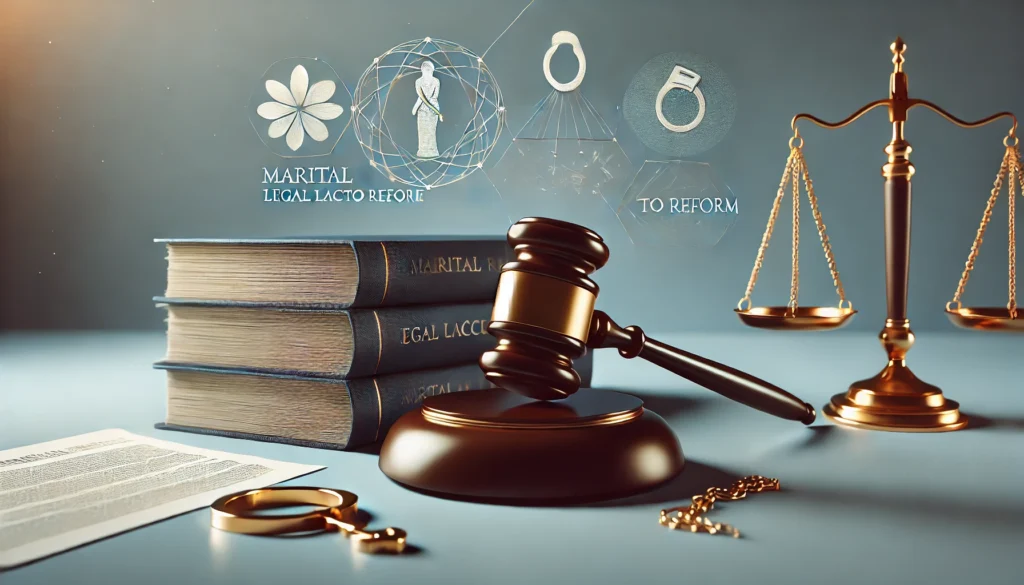Published on: 30th October 2024
Authored by: Bikram Kumar
BMT Law College
Introduction
Marriage is considered a ceremony that brings two people together for life. Many say marriage is a pre-destined event. But, personal grudges or lack of satisfaction in a relationship, can make the lives of the two people involved and also their family members difficult. In such a case, God forbid a divorce happens, then there arises a question of financial support to either the husband or wife. This concept is known as maintenance. Alimony and maintenance are important aspects of Indian family law that are aimed to provide financial support to spouses and dependent children following divorce or dissolution. Alimony and maintenance laws involve laws that differ under purview of personal laws in India, eligibility criteria, and factors determining the amount awarded. This knowledge can empower them to make informed decisions and navigate the complexities of seeking or providing financial support after a marriage breakdown and family complexities.
Concept of Maintenance in India:
Sometimes, a marriage can go sideways. The last resort in such a case is divorce. After getting divorced, the wife must take care of herself and if she’s a mother, then her children. Hence, it may become difficult for a single parent to provide for all the basic requirements of life like food, shelter, clothes, education, etc. Hence, as the principles of social justice talk about resources, and equity, it becomes a duty of the man to provide for these basic needs. This concept in a legal sense is called maintenance.
In India, maintenance laws are stringent and applicable to all citizens. The maintenance laws in India, provide support to those parents, wives, and children who are unable to maintain themselves. It is the duty of the man to provide for maintenance.
So why is maintenance given? The Indian Judiciary has answered this question in various judgments. In the case of Badshah v Urmila Badshah Godse and Anr (2013), the Supreme Court held that the laws regarding the concept of maintenance are established, to project and empower the destitute, achieve social justice, and maintain the dignity of the individual.
The Indian Constitution has in its Article 15(3) given the states the power to make laws protecting the rights and interests of women and children. Hence in India, there are separate laws as well as personal laws for people belonging to their respective religions, that protect the rights of women, children, and parents for claiming maintenance.
Maintenance is a principle that allows a spouse to obtain financial support after divorce. It entails taking into account elements such as the couple’s monthly income and financial situation. When granting maintenance, the court also examines the maintenance of children, as maintenance is linked to divorce.
Maintenance under Hindu Law:
The Hindu Adoption and Maintenance Act permits Hindu couples to receive support under the Hindu Marriage Act. When it comes to maintenance amounts, the court is the final arbiter. Section 24 provides for pendente lite support and costs for both husband and wife, while Section 25 provides for lifetime support for low-income men and wives. The Delhi High Court has ruled that spouses who do not earn a living can seek support after divorce. Section 13B of the Hindu Marriage Act of 1955 addresses the process of divorce with mutual consent. It offers a less contentious method for spouses who jointly agree to end their marriage. Section 18 of the Hindu Adoption and Maintenance Act, 1956 (HAMA) clearly addresses instances in which the husband is unable to maintain himself.
Maintenance under Muslim Law:
NAFAQA is a Muslim legislation that requires males to provide for their women and families, which includes accommodation, food, and sustenance. The Muslim Women (Protection of Rights on Divorce) Act of 1986 governs this. Within the authorised IDDAT period, a wife can demand a fair amount from her ex-husband, whereas Muslim men must provide the promised Dower or Meher. Pregnant women can claim maintenance for at least two years after childbirth, and if the wife has custody of the child, they can claim support until remarriage. The spouse pays special allowances such as kharch-e-pandan, guzara, and mewa khore etc.
Maintenance under Christian Law:
The Indian Divorce Act, 1869 applies to claims filed by Christian spouses; according to the Act, the amount of support cannot exceed one-fifth of the husband’s salary. If a woman remarries or is proven to be chaste, she will not receive maintenance. There is no legal limit to Christian women claiming maintenance from their spouse through criminal or civil proceedings. If a divorced Christian wife is unable to support herself after the divorce, she may seek alimony/maintenance under Section 37 of the Indian Divorce Act of 1869. Similar to Parsi law, the Act governs maintenance rights for Christians and applies the same considerations to both, pendente lite and permanent maintenance. The provisions of THE INDIAN DIVORCE ACT, 1869 are reproduced above under part IX – sections 36-38.
Alimony:
Alimony is the financial assistance that one spouse is legally obligated to pay to the other after a divorce or legal separation. Alimony is intended to assist the ex-spouse in maintaining an acceptable standard of life comparable to what they enjoyed during the marriage. Paid by the financially stronger spouse, alimony is taxable in India.
Consequential grounds for awarding alimony under Indian Laws:
- Both spouses’ earnings and income
- Duration of the marriage
- Age and overall condition of both spouses
- The lifestyle that resulted from the marriage
- Money requirements and obligations of both spouses
- Any additional pertinent elements
Alimony under Hindu Law:
According to the Hindu Marriage Act of 1955, both the wife and husband are entitled to maintenance from the other spouse based on variables such as income, employment status, assets, and liabilities. In India, alimony standards are based on mutual understanding, but in contested divorces, the court makes a case-by-case decision. The wife may also seek maintenance under Section 18 of the Hindu Adoptions and Maintenance Act of 1956 for reasons such as abandonment, conversion, having another wife, leprosy, cruelty, having a concubine, or other causes for separation. According to Section 23 of the Act, the court has the power to grant maintenance and the amount. Only the wife can claim divorce alimony under the Special Marriage Act of 1954.
Alimony under Christian Law:
The Indian Divorce Act of 1869 establishes alimony for Christian law that covers the support of a separated woman. Sections 36, 37, and 38 offer financial support to the wife while judicial actions are pending. Section 36 discusses expenses and alimony vs. maintenance, whereas Section 37 discusses permanent alimony vs. maintenance. If the husband is unable to pay a weekly or monthly sum for financial assistance, the court may temporarily suspend the order. Section 38 establishes the requirements for alimony payment, ensuring that it is paid on time and in full.
Alimony under Muslim Law:
The Muslim Women (Protection of Rights on Divorce) Act, 1986 provides provisions for maintenance and alimony after a divorce. The wife is entitled to a reasonable and fair amount during the iddat period, equal to the dowry agreed upon during marriage, and a title to property. Separating wives can claim maintenance if they cannot maintain themselves after the iddat period or cannot support their children. If no one pays the maintenance, the magistrate orders the State Wakf Board to pay it.
DENYING OF ALIMONY:
- Adultery/Infidelity:- The husband may refuse to pay the alimony , if the wife is accused of infidelity.
- Remarriage:- The husband can request for the denial of the alimony , when the wife gets remarried.
- Well-Earning:- If the wife’s income is much higher than the husband’s, the alimony agreement can be waived. However, the court has the last say. In some situations, the wife may be ordered to pay alimony by the court.
PERMANENT MAINTENANCE AND ALIMONY:
Section 37 of the Special Marriage Act, 1954 speaks of the permanent maintenance and alimony:
Under section 37 Permanent alimony and maintenance:—
- Any court exercising jurisdiction under Chapter V or Chapter VI may, at the time of passing any decree or at any time subsequent to the decree, on application made to it for the purpose, order that the husband shall secure to the wife for her maintenance and support, if necessary, by a charge on the husband’s property such gross sum or such monthly or periodical payment of money for a term not exceeding her life, as, having regard to her own property, if any, her husband’s property and ability 1[the conduct of the parties and other circumstances of the case], it may seem to the court to be just.
- If the district court is satisfied that the wife in whose favour an order has been made under this section has re-married or is not leading a chaste life, 2[it may, at the instance of the husband vary, modify or rescind any such order and in such manner as the court may deem just.]
Section 25 of Hindu Marriage Act, 1955
Perhaps the most important provision for the right of maintenance, under the Hindu Law is mentioned in Section 25 of the Hindu Marriage Act, 1955. Before analysing this provision, let us first look at what it says:-
This Section talks about permanent alimony and maintenance stating that:-
- Any court that has jurisdiction under this Act shall on an application made by either the wife or the husband for grant of maintenance, order the non-applicant to pay for the maintenance and support of the applicant, either a yearly or monthly sum for a term not exceeding the life of the applicant, with regards to the non-applicant’s income and property, and any such payment may also be secured by charging the non-applicant’s immovable property.
- If the court is satisfied that there is a change in the current situation after passing the order, then the court may modify, or rescind the order at the instance of either party.
- If the court is satisfied that the party in whose name the order is placed has re-married, or if the wife has not remained chaste, or if the husband has had sexual intercourse with any other woman, then the court at the instance of the party may modify, rescind the order.
Types of maintenance
Now, the Hindu Marriage Act, mentions two types of maintenance, which are as follows:-
Interim maintenance
Section 24 of the Act, talks about interim maintenance or maintenance pendente lite. It states that if a situation arises where the wife or the husband does not have sufficient income to support his or her daily and necessary expenses, the court may on an application grant the non-applicant to pay to the applicant the expenses required monthly, during the proceedings, taking into consideration the income of both the parties. The amount granted in such a case is not fixed and entirely depends on the court to decide. Thus, interim maintenance is given during the course of the court proceedings.
Permanent maintenance
Permanent alimony and maintenance are given under Section 25 of the Act, as mentioned above. This type of maintenance is given at the time of passing an order for divorce.
Difference between Alimony and Maintenance
Section 25 of the Hindu Marriage Act, mentions the terms alimony and maintenance. So, are they the same?
Alimony is a one-time payment made to either the husband or wife whereas maintenance can be monthly, annually or instalments fixed by the court. Further, alimony is mostly referred to when divorce is done by mutual consent. Maintenance is given in cases where one party has filed for divorce and the other party has contested it in court.
Can a wife claim maintenance without getting divorced?
After reading the above provisions, you must be wondering whether a divorced wife is the only one who can claim maintenance? This is not the case. Even before the divorce, if the wife has separated from her husband, she can claim maintenance. However, the only criteria for which the wife is not entitled to claim maintenance is as follows:-
- If the wife is living with another man, she cannot claim maintenance under Section 25 of the Hindu Marriage Act
- If there isn’t any genuine reason for the separation between the wife and the husband, maintenance cannot be claimed.
- When the husband and wife are living separately by mutual consent, they cannot claim for maintenance.
In the case of Dr. Kulbhushan Kumar v Raj Kumari & Anr (1970), it was held by the Court that 25% of the current salary of the husband should be kept for maintenance.
Conclusion
All maintenance laws in India has different provisions. Section 25 of the Hindu Marriage Act is one such provision. India is a rapidly growing country. People are also evolving and trying to come out of the 50s 60s mindset. In today’s world, both men and women have equal legal status. However, there are still certain legal provisions that might have gone unnoticed, and need rejig. These include clauses 2 and 3 of Section 25 of the Hindu Marriage Act 1955.
Alimony and maintenance are important legal notions in India because they ensure financial security and well-being for spouses and children after a divorce. However, concerns such as prolonged legal proceedings, enforcement issues, and a lack of knowledge continue. Streamlining legal procedures, bolstering enforcement mechanisms, and raising public knowledge are critical steps towards a more efficient and equitable system. These ideas provide financial assistance and self-sufficiency, which contributes to the general well-being of individuals and children at this difficult time.
References
https://www.indiacode.nic.in/bitstream/123456789/3965/1/Christian_Marriage_and_Divorce_Act_1957.pdf
https://indiankanoon.org/doc/1933289/
https://www.indiacode.nic.in/bitstream/123456789/2476/1/a1936_____3.pdf
https://www.indiacode.nic.in/bitstream/123456789/15480/1/special_marriage_act.pdf
https://highcourtchd.gov.in/hclscc/subpages/pdf_files/4.pdf
https://indiankanoon.org/doc/95286/
https://www.scconline.com/blog/post/tag/section-25-of-hindu-marriage-act/




